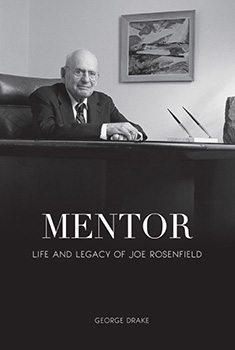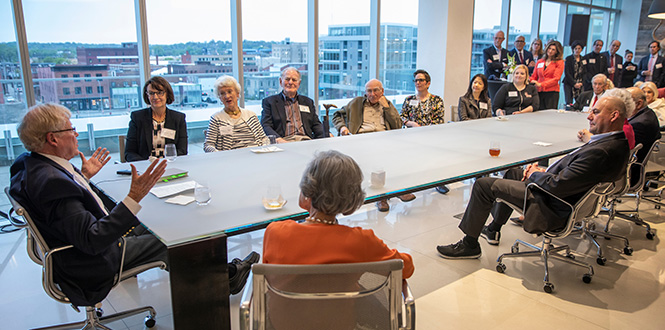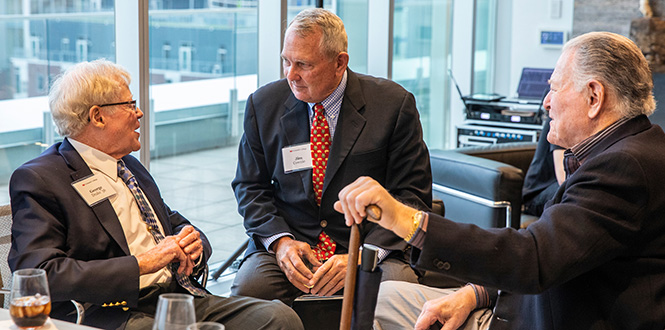Biography details Joe Rosenfield’s innumerable contributions to Grinnell College
May 16, 2019 — George Drake ’56 readily admits he was among the people who were sitting there “wide eyed and open mouthed.”
 Mentor book cover
Mentor book cover
The year was 1975, and the venue was the Grinnell College Board of Trustee meeting. Joe Rosenfield ’25 had pitched the idea that the College should purchase WDTN, a television station in Dayton, Ohio. Joe’s good friend, Warren Buffett, spent the next hour presenting the reasons why a liberal arts college 600 miles away should spend $12.9 million on a NBC station broadcasting Sanford & Son, Little House on the Prairie, and other programing to residents of western Ohio.
After such an out-of-the box investment proposal, it would be natural for the other Trustees to voice concerns or pose questions. However, that was not the case.
“There was enough trust in Joe and Warren that the board just voted for it,” Drake says. “The most interesting part of the discussion came afterwards about ways to keep the students from wanting to run the station.”
This story – which concludes with the happy ending that Grinnell sold the station for $49 million less than a decade later – is one of many within the pages of Mentor: Life and Legacy of Joe Rosenfield that demonstrate the influence and impact of the Grinnell trustee, businessman, lawyer, and philanthropist.
The book, released in May by Business Publications Corp., chronicles Rosenfield’s life, wit, and steadfast love for Grinnell College. The biography is separated into four parts, each one dedicated to taking a deep look at the different aspects of what drove Rosenfield. Drake, who served with Rosenfield as Trustees for 9 years and then was president of the College from 1979 to 1991, says his favorite thing about writing the book was knowing he was doing it for Joe.
 George Drake ‘56, left, president emeritus of Grinnell College, talks about the life of Joe Rosenfield ’25 at a Des Moines event to launch the new Rosenfield biography.
George Drake ‘56, left, president emeritus of Grinnell College, talks about the life of Joe Rosenfield ’25 at a Des Moines event to launch the new Rosenfield biography.
“Warren Buffett is quoted in the book as saying he would do anything for Joe, and most people who knew Joe felt that way,” Drake says. “This story deserves to be told and to be able to be the person who wrote it was a real privilege. There’s no question we would not be the College we are today without Joe Rosenfield.”
Rosenfield joined the Board of Trustees in 1941 eight days before the bombing of Pearl Harbor. It took him all of one meeting to realize he had gotten him into a daunting situation.
“The endowment in those days was primarily made up of farms and dormitories,” Drake says. “While dorms can bring in revenue, they don’t bring in profit. The endowment was worth about $78,000. Joe recognized there was no way the College would survive long term without greatly increasing the endowment. It took a long time to get it the point where you could call it a substantial endowment.”
But get there Grinnell would thanks to a series of wise investments instrumented by Rosenfield, some of which (like the TV station) could be called unconventional. At the time of Rosenfield’s death in 2000 at age 96, Grinnell’s endowment was over $1 billion.
So what made Rosenfield a shrewd investor?
“He learned from his early mistakes and was very strategic,” Drake says. “He invested with a lot of thought and research, and above all if he thought something was really valuable, he stuck with it. He did not move in and out of the market.”
Beyond investing, Mentor delves into Joe’s time as a Grinnell student, family life, work as chairman of Younkers, his ownership stake in the Chicago Cubs, and his community contributions in Grinnell and Des Moines. While researching Rosenfield, Drake says the family stories and Des Moines accomplishments were the biggest revelations to him.
“I came to the conclusion that Joe did just as much for Des Moines as he did for Grinnell, which is saying a lot,” he says.
 Drake talks with Jim Cownie, center, a Des Moines developer who brought up the idea for the Rosenfield book, and Bill Friedman, a former CEO of Younkers who helped Drake with biographical research.
Drake talks with Jim Cownie, center, a Des Moines developer who brought up the idea for the Rosenfield book, and Bill Friedman, a former CEO of Younkers who helped Drake with biographical research.
Readers will meet several Des Moines leaders and institutions in the book whose livelihoods intersected with Rosenfield for the better, including Jim Cownie, a Des Moines developer and civic leader, who approached the College in 2014 about the idea of a Rosenfield book. Cownie also provided philanthropic gift support to help underwrite the project.
Drake agreed to write the book within a day of hearing about it, but a project of this magnitude took awhile to plan and carry out. As a history professor, Drake was used to archival research, but he had never collected oral histories before. The first person Drake interviewed was Bill Friedman, a former CEO of Younkers, who had put together a Younkers archive in the Iowa Historical Society. That along with old copies of the Scarlet & Black newspaper and the Trustee minutes proved invaluable.
Then there was fascinating conversations with family members, associates, and friends including Buffett, who wrote the book’s forward. Drake asked Buffett if he and Rosenfield ever disagreed about investments. The answer was no.
“Joe was wise, humorous, generous, friendly, public-spirited – possessing all of those qualities to an extraordinary degree,” Buffett wrote. “But most of all, he was interested in you. Whether a presidential hopeful planning campaign strategies or a confused student contemplating his or her future, the person seeking Joe’s wisdom received his full attention.”
Mentor: Life and Legacy of Joe Rosenfield is available for purchase at the Grinnell College Pioneer Bookshop, 933 Main St. or on the Pioneer Bookshop website.
— by Jeremy Shapiro
For your information:
George Drake ’56 will speak about Mentor: Life and Legacy of Joe Rosenfield and other Grinnell historical topics during the Honorary Faculty Lecture at Reunion 2019. The lecture, which is sponsored by the class of 1969, begins at 10:30 a.m. on June 1 at Harris Cinema.
To read more alumni news, check out our news archive.